Contract Law: Analysis of Legal Obligations in a Political Rally
VerifiedAdded on 2023/06/15
|5
|1918
|199
AI Summary
This article discusses the legal obligations of Nick, John, Hanson, and Ian in a political rally. It analyzes the contract claims and rules applied in each case. The article provides insights into the contextual obligations between the parties and the steps that could be taken to get their contractual money back.
Contribute Materials
Your contribution can guide someone’s learning journey. Share your
documents today.
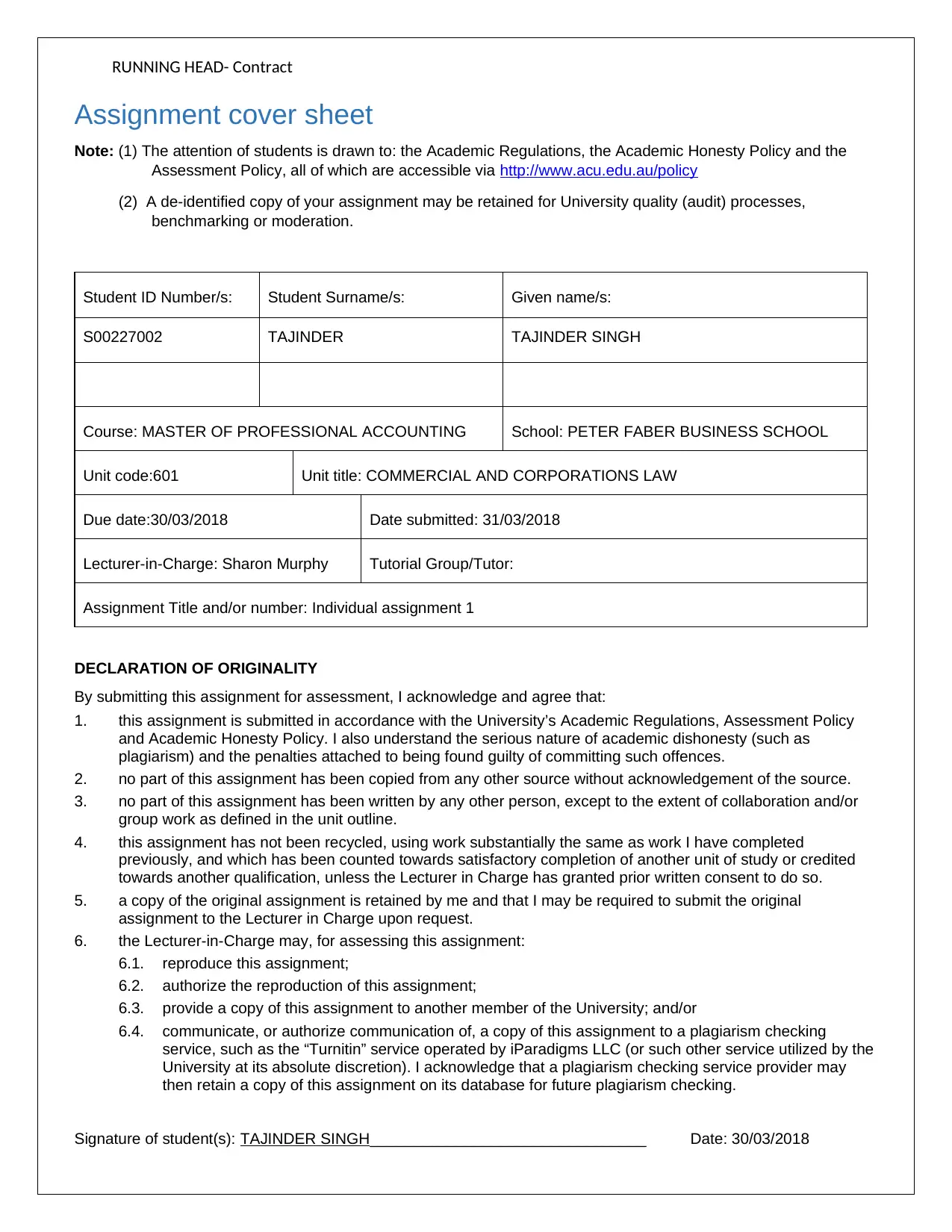
RUNNING HEAD- Contract
Assignment cover sheet
Note: (1) The attention of students is drawn to: the Academic Regulations, the Academic Honesty Policy and the
Assessment Policy, all of which are accessible via http://www.acu.edu.au/policy
(2) A de-identified copy of your assignment may be retained for University quality (audit) processes,
benchmarking or moderation.
Student ID Number/s: Student Surname/s: Given name/s:
S00227002 TAJINDER TAJINDER SINGH
Course: MASTER OF PROFESSIONAL ACCOUNTING School: PETER FABER BUSINESS SCHOOL
Unit code:601 Unit title: COMMERCIAL AND CORPORATIONS LAW
Due date:30/03/2018 Date submitted: 31/03/2018
Lecturer-in-Charge: Sharon Murphy Tutorial Group/Tutor:
Assignment Title and/or number: Individual assignment 1
DECLARATION OF ORIGINALITY
By submitting this assignment for assessment, I acknowledge and agree that:
1. this assignment is submitted in accordance with the University’s Academic Regulations, Assessment Policy
and Academic Honesty Policy. I also understand the serious nature of academic dishonesty (such as
plagiarism) and the penalties attached to being found guilty of committing such offences.
2. no part of this assignment has been copied from any other source without acknowledgement of the source.
3. no part of this assignment has been written by any other person, except to the extent of collaboration and/or
group work as defined in the unit outline.
4. this assignment has not been recycled, using work substantially the same as work I have completed
previously, and which has been counted towards satisfactory completion of another unit of study or credited
towards another qualification, unless the Lecturer in Charge has granted prior written consent to do so.
5. a copy of the original assignment is retained by me and that I may be required to submit the original
assignment to the Lecturer in Charge upon request.
6. the Lecturer-in-Charge may, for assessing this assignment:
6.1. reproduce this assignment;
6.2. authorize the reproduction of this assignment;
6.3. provide a copy of this assignment to another member of the University; and/or
6.4. communicate, or authorize communication of, a copy of this assignment to a plagiarism checking
service, such as the “Turnitin” service operated by iParadigms LLC (or such other service utilized by the
University at its absolute discretion). I acknowledge that a plagiarism checking service provider may
then retain a copy of this assignment on its database for future plagiarism checking.
Signature of student(s): TAJINDER SINGH________________________________ Date: 30/03/2018
Assignment cover sheet
Note: (1) The attention of students is drawn to: the Academic Regulations, the Academic Honesty Policy and the
Assessment Policy, all of which are accessible via http://www.acu.edu.au/policy
(2) A de-identified copy of your assignment may be retained for University quality (audit) processes,
benchmarking or moderation.
Student ID Number/s: Student Surname/s: Given name/s:
S00227002 TAJINDER TAJINDER SINGH
Course: MASTER OF PROFESSIONAL ACCOUNTING School: PETER FABER BUSINESS SCHOOL
Unit code:601 Unit title: COMMERCIAL AND CORPORATIONS LAW
Due date:30/03/2018 Date submitted: 31/03/2018
Lecturer-in-Charge: Sharon Murphy Tutorial Group/Tutor:
Assignment Title and/or number: Individual assignment 1
DECLARATION OF ORIGINALITY
By submitting this assignment for assessment, I acknowledge and agree that:
1. this assignment is submitted in accordance with the University’s Academic Regulations, Assessment Policy
and Academic Honesty Policy. I also understand the serious nature of academic dishonesty (such as
plagiarism) and the penalties attached to being found guilty of committing such offences.
2. no part of this assignment has been copied from any other source without acknowledgement of the source.
3. no part of this assignment has been written by any other person, except to the extent of collaboration and/or
group work as defined in the unit outline.
4. this assignment has not been recycled, using work substantially the same as work I have completed
previously, and which has been counted towards satisfactory completion of another unit of study or credited
towards another qualification, unless the Lecturer in Charge has granted prior written consent to do so.
5. a copy of the original assignment is retained by me and that I may be required to submit the original
assignment to the Lecturer in Charge upon request.
6. the Lecturer-in-Charge may, for assessing this assignment:
6.1. reproduce this assignment;
6.2. authorize the reproduction of this assignment;
6.3. provide a copy of this assignment to another member of the University; and/or
6.4. communicate, or authorize communication of, a copy of this assignment to a plagiarism checking
service, such as the “Turnitin” service operated by iParadigms LLC (or such other service utilized by the
University at its absolute discretion). I acknowledge that a plagiarism checking service provider may
then retain a copy of this assignment on its database for future plagiarism checking.
Signature of student(s): TAJINDER SINGH________________________________ Date: 30/03/2018
Secure Best Marks with AI Grader
Need help grading? Try our AI Grader for instant feedback on your assignments.
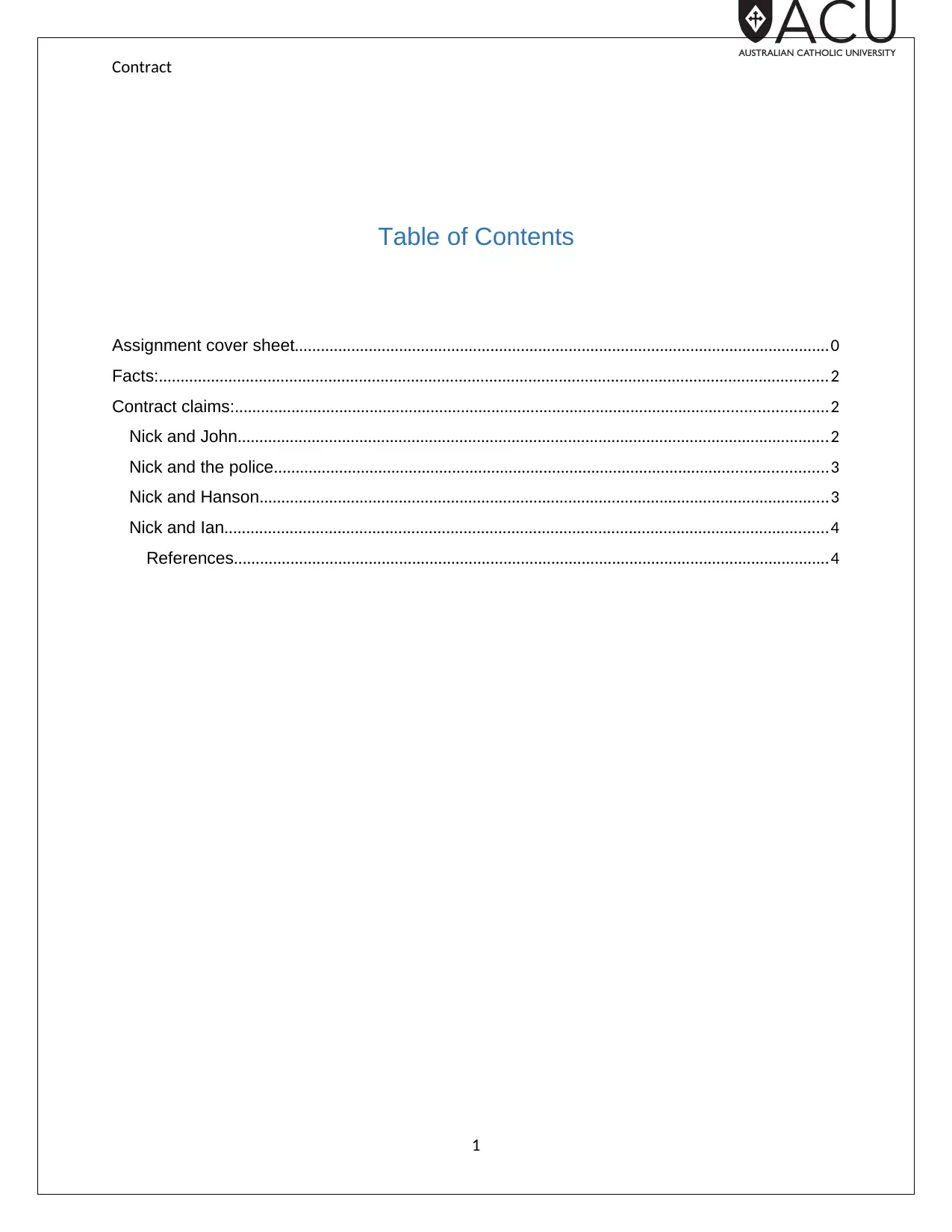
Contract
Table of Contents
Assignment cover sheet...........................................................................................................................0
Facts:..........................................................................................................................................................2
Contract claims:........................................................................................................................................2
Nick and John........................................................................................................................................2
Nick and the police...............................................................................................................................3
Nick and Hanson...................................................................................................................................3
Nick and Ian...........................................................................................................................................4
References.........................................................................................................................................4
1
Table of Contents
Assignment cover sheet...........................................................................................................................0
Facts:..........................................................................................................................................................2
Contract claims:........................................................................................................................................2
Nick and John........................................................................................................................................2
Nick and the police...............................................................................................................................3
Nick and Hanson...................................................................................................................................3
Nick and Ian...........................................................................................................................................4
References.........................................................................................................................................4
1
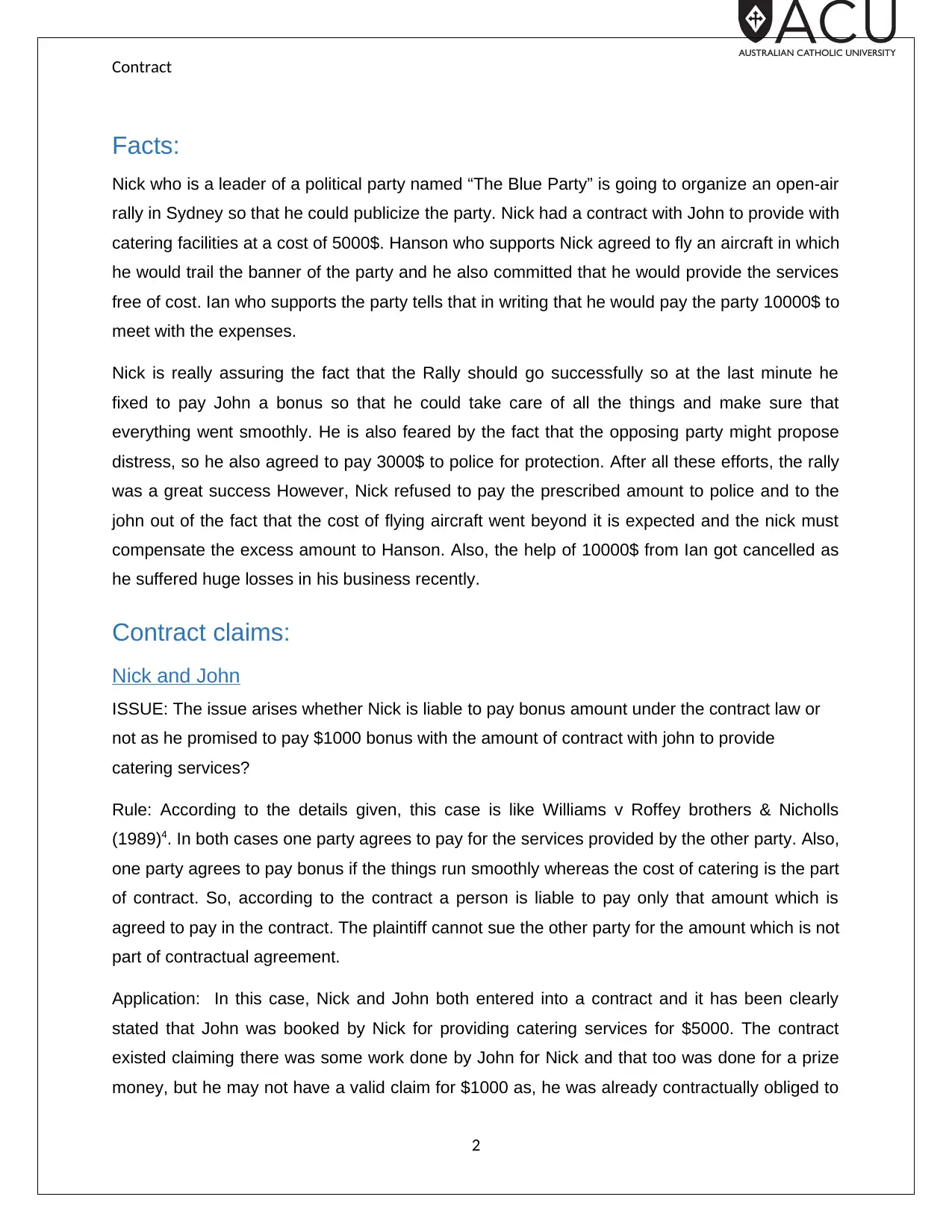
Contract
Facts:
Nick who is a leader of a political party named “The Blue Party” is going to organize an open-air
rally in Sydney so that he could publicize the party. Nick had a contract with John to provide with
catering facilities at a cost of 5000$. Hanson who supports Nick agreed to fly an aircraft in which
he would trail the banner of the party and he also committed that he would provide the services
free of cost. Ian who supports the party tells that in writing that he would pay the party 10000$ to
meet with the expenses.
Nick is really assuring the fact that the Rally should go successfully so at the last minute he
fixed to pay John a bonus so that he could take care of all the things and make sure that
everything went smoothly. He is also feared by the fact that the opposing party might propose
distress, so he also agreed to pay 3000$ to police for protection. After all these efforts, the rally
was a great success However, Nick refused to pay the prescribed amount to police and to the
john out of the fact that the cost of flying aircraft went beyond it is expected and the nick must
compensate the excess amount to Hanson. Also, the help of 10000$ from Ian got cancelled as
he suffered huge losses in his business recently.
Contract claims:
Nick and John
ISSUE: The issue arises whether Nick is liable to pay bonus amount under the contract law or
not as he promised to pay $1000 bonus with the amount of contract with john to provide
catering services?
Rule: According to the details given, this case is like Williams v Roffey brothers & Nicholls
(1989)4. In both cases one party agrees to pay for the services provided by the other party. Also,
one party agrees to pay bonus if the things run smoothly whereas the cost of catering is the part
of contract. So, according to the contract a person is liable to pay only that amount which is
agreed to pay in the contract. The plaintiff cannot sue the other party for the amount which is not
part of contractual agreement.
Application: In this case, Nick and John both entered into a contract and it has been clearly
stated that John was booked by Nick for providing catering services for $5000. The contract
existed claiming there was some work done by John for Nick and that too was done for a prize
money, but he may not have a valid claim for $1000 as, he was already contractually obliged to
2
Facts:
Nick who is a leader of a political party named “The Blue Party” is going to organize an open-air
rally in Sydney so that he could publicize the party. Nick had a contract with John to provide with
catering facilities at a cost of 5000$. Hanson who supports Nick agreed to fly an aircraft in which
he would trail the banner of the party and he also committed that he would provide the services
free of cost. Ian who supports the party tells that in writing that he would pay the party 10000$ to
meet with the expenses.
Nick is really assuring the fact that the Rally should go successfully so at the last minute he
fixed to pay John a bonus so that he could take care of all the things and make sure that
everything went smoothly. He is also feared by the fact that the opposing party might propose
distress, so he also agreed to pay 3000$ to police for protection. After all these efforts, the rally
was a great success However, Nick refused to pay the prescribed amount to police and to the
john out of the fact that the cost of flying aircraft went beyond it is expected and the nick must
compensate the excess amount to Hanson. Also, the help of 10000$ from Ian got cancelled as
he suffered huge losses in his business recently.
Contract claims:
Nick and John
ISSUE: The issue arises whether Nick is liable to pay bonus amount under the contract law or
not as he promised to pay $1000 bonus with the amount of contract with john to provide
catering services?
Rule: According to the details given, this case is like Williams v Roffey brothers & Nicholls
(1989)4. In both cases one party agrees to pay for the services provided by the other party. Also,
one party agrees to pay bonus if the things run smoothly whereas the cost of catering is the part
of contract. So, according to the contract a person is liable to pay only that amount which is
agreed to pay in the contract. The plaintiff cannot sue the other party for the amount which is not
part of contractual agreement.
Application: In this case, Nick and John both entered into a contract and it has been clearly
stated that John was booked by Nick for providing catering services for $5000. The contract
existed claiming there was some work done by John for Nick and that too was done for a prize
money, but he may not have a valid claim for $1000 as, he was already contractually obliged to
2
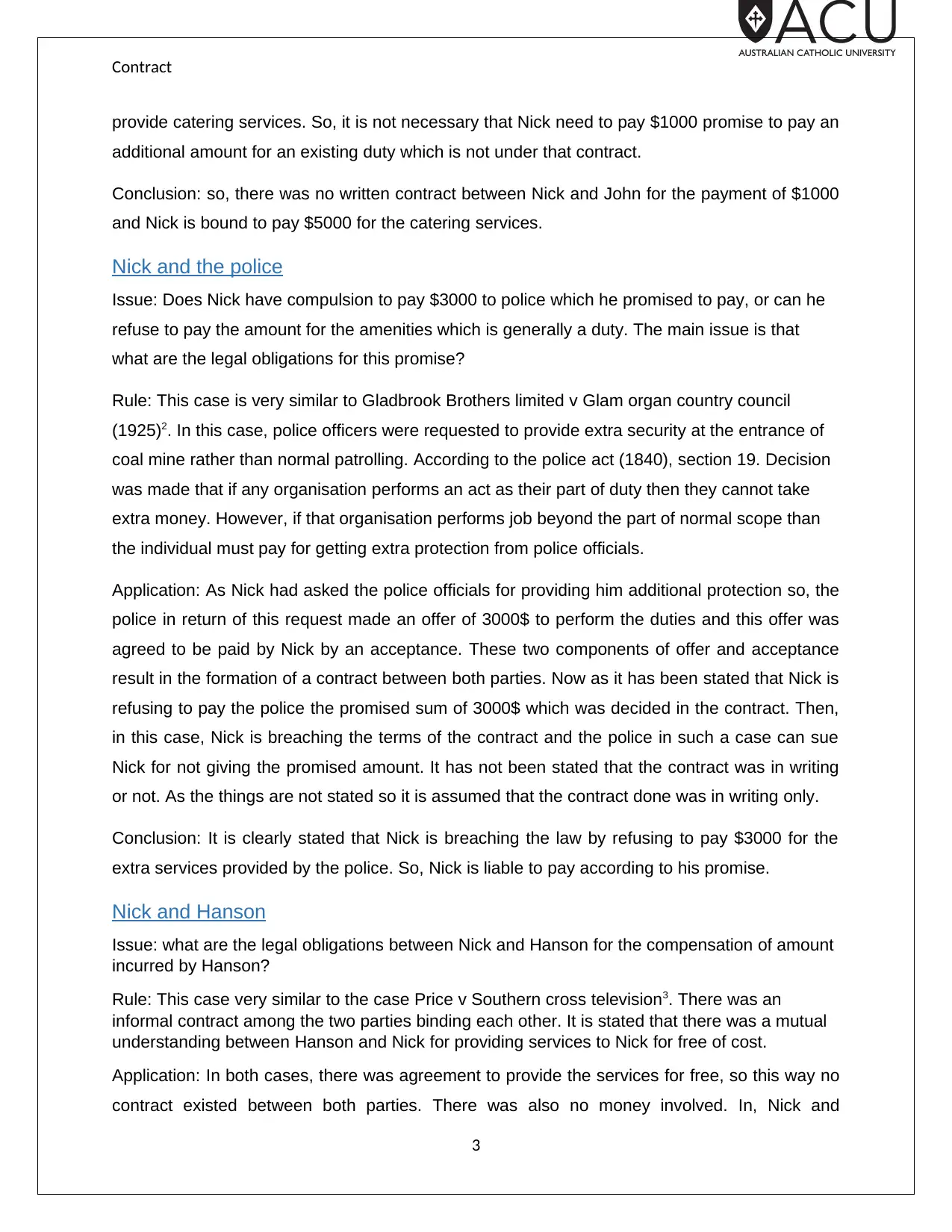
Contract
provide catering services. So, it is not necessary that Nick need to pay $1000 promise to pay an
additional amount for an existing duty which is not under that contract.
Conclusion: so, there was no written contract between Nick and John for the payment of $1000
and Nick is bound to pay $5000 for the catering services.
Nick and the police
Issue: Does Nick have compulsion to pay $3000 to police which he promised to pay, or can he
refuse to pay the amount for the amenities which is generally a duty. The main issue is that
what are the legal obligations for this promise?
Rule: This case is very similar to Gladbrook Brothers limited v Glam organ country council
(1925)2. In this case, police officers were requested to provide extra security at the entrance of
coal mine rather than normal patrolling. According to the police act (1840), section 19. Decision
was made that if any organisation performs an act as their part of duty then they cannot take
extra money. However, if that organisation performs job beyond the part of normal scope than
the individual must pay for getting extra protection from police officials.
Application: As Nick had asked the police officials for providing him additional protection so, the
police in return of this request made an offer of 3000$ to perform the duties and this offer was
agreed to be paid by Nick by an acceptance. These two components of offer and acceptance
result in the formation of a contract between both parties. Now as it has been stated that Nick is
refusing to pay the police the promised sum of 3000$ which was decided in the contract. Then,
in this case, Nick is breaching the terms of the contract and the police in such a case can sue
Nick for not giving the promised amount. It has not been stated that the contract was in writing
or not. As the things are not stated so it is assumed that the contract done was in writing only.
Conclusion: It is clearly stated that Nick is breaching the law by refusing to pay $3000 for the
extra services provided by the police. So, Nick is liable to pay according to his promise.
Nick and Hanson
Issue: what are the legal obligations between Nick and Hanson for the compensation of amount
incurred by Hanson?
Rule: This case very similar to the case Price v Southern cross television3. There was an
informal contract among the two parties binding each other. It is stated that there was a mutual
understanding between Hanson and Nick for providing services to Nick for free of cost.
Application: In both cases, there was agreement to provide the services for free, so this way no
contract existed between both parties. There was also no money involved. In, Nick and
3
provide catering services. So, it is not necessary that Nick need to pay $1000 promise to pay an
additional amount for an existing duty which is not under that contract.
Conclusion: so, there was no written contract between Nick and John for the payment of $1000
and Nick is bound to pay $5000 for the catering services.
Nick and the police
Issue: Does Nick have compulsion to pay $3000 to police which he promised to pay, or can he
refuse to pay the amount for the amenities which is generally a duty. The main issue is that
what are the legal obligations for this promise?
Rule: This case is very similar to Gladbrook Brothers limited v Glam organ country council
(1925)2. In this case, police officers were requested to provide extra security at the entrance of
coal mine rather than normal patrolling. According to the police act (1840), section 19. Decision
was made that if any organisation performs an act as their part of duty then they cannot take
extra money. However, if that organisation performs job beyond the part of normal scope than
the individual must pay for getting extra protection from police officials.
Application: As Nick had asked the police officials for providing him additional protection so, the
police in return of this request made an offer of 3000$ to perform the duties and this offer was
agreed to be paid by Nick by an acceptance. These two components of offer and acceptance
result in the formation of a contract between both parties. Now as it has been stated that Nick is
refusing to pay the police the promised sum of 3000$ which was decided in the contract. Then,
in this case, Nick is breaching the terms of the contract and the police in such a case can sue
Nick for not giving the promised amount. It has not been stated that the contract was in writing
or not. As the things are not stated so it is assumed that the contract done was in writing only.
Conclusion: It is clearly stated that Nick is breaching the law by refusing to pay $3000 for the
extra services provided by the police. So, Nick is liable to pay according to his promise.
Nick and Hanson
Issue: what are the legal obligations between Nick and Hanson for the compensation of amount
incurred by Hanson?
Rule: This case very similar to the case Price v Southern cross television3. There was an
informal contract among the two parties binding each other. It is stated that there was a mutual
understanding between Hanson and Nick for providing services to Nick for free of cost.
Application: In both cases, there was agreement to provide the services for free, so this way no
contract existed between both parties. There was also no money involved. In, Nick and
3
Secure Best Marks with AI Grader
Need help grading? Try our AI Grader for instant feedback on your assignments.
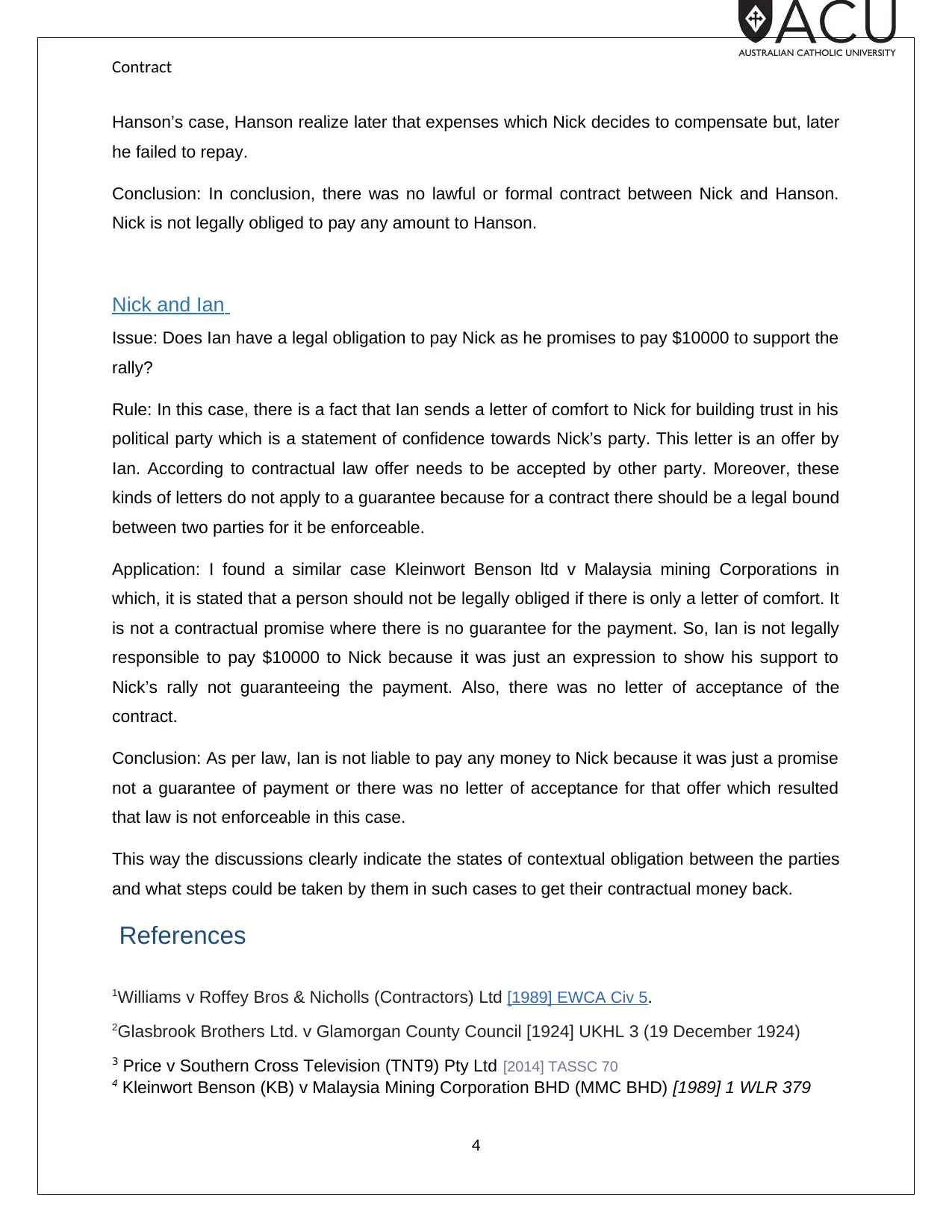
Contract
Hanson’s case, Hanson realize later that expenses which Nick decides to compensate but, later
he failed to repay.
Conclusion: In conclusion, there was no lawful or formal contract between Nick and Hanson.
Nick is not legally obliged to pay any amount to Hanson.
Nick and Ian
Issue: Does Ian have a legal obligation to pay Nick as he promises to pay $10000 to support the
rally?
Rule: In this case, there is a fact that Ian sends a letter of comfort to Nick for building trust in his
political party which is a statement of confidence towards Nick’s party. This letter is an offer by
Ian. According to contractual law offer needs to be accepted by other party. Moreover, these
kinds of letters do not apply to a guarantee because for a contract there should be a legal bound
between two parties for it be enforceable.
Application: I found a similar case Kleinwort Benson ltd v Malaysia mining Corporations in
which, it is stated that a person should not be legally obliged if there is only a letter of comfort. It
is not a contractual promise where there is no guarantee for the payment. So, Ian is not legally
responsible to pay $10000 to Nick because it was just an expression to show his support to
Nick’s rally not guaranteeing the payment. Also, there was no letter of acceptance of the
contract.
Conclusion: As per law, Ian is not liable to pay any money to Nick because it was just a promise
not a guarantee of payment or there was no letter of acceptance for that offer which resulted
that law is not enforceable in this case.
This way the discussions clearly indicate the states of contextual obligation between the parties
and what steps could be taken by them in such cases to get their contractual money back.
References
1Williams v Roffey Bros & Nicholls (Contractors) Ltd [1989] EWCA Civ 5.
2Glasbrook Brothers Ltd. v Glamorgan County Council [1924] UKHL 3 (19 December 1924)
3 Price v Southern Cross Television (TNT9) Pty Ltd [2014] TASSC 70
4 Kleinwort Benson (KB) v Malaysia Mining Corporation BHD (MMC BHD) [1989] 1 WLR 379
4
Hanson’s case, Hanson realize later that expenses which Nick decides to compensate but, later
he failed to repay.
Conclusion: In conclusion, there was no lawful or formal contract between Nick and Hanson.
Nick is not legally obliged to pay any amount to Hanson.
Nick and Ian
Issue: Does Ian have a legal obligation to pay Nick as he promises to pay $10000 to support the
rally?
Rule: In this case, there is a fact that Ian sends a letter of comfort to Nick for building trust in his
political party which is a statement of confidence towards Nick’s party. This letter is an offer by
Ian. According to contractual law offer needs to be accepted by other party. Moreover, these
kinds of letters do not apply to a guarantee because for a contract there should be a legal bound
between two parties for it be enforceable.
Application: I found a similar case Kleinwort Benson ltd v Malaysia mining Corporations in
which, it is stated that a person should not be legally obliged if there is only a letter of comfort. It
is not a contractual promise where there is no guarantee for the payment. So, Ian is not legally
responsible to pay $10000 to Nick because it was just an expression to show his support to
Nick’s rally not guaranteeing the payment. Also, there was no letter of acceptance of the
contract.
Conclusion: As per law, Ian is not liable to pay any money to Nick because it was just a promise
not a guarantee of payment or there was no letter of acceptance for that offer which resulted
that law is not enforceable in this case.
This way the discussions clearly indicate the states of contextual obligation between the parties
and what steps could be taken by them in such cases to get their contractual money back.
References
1Williams v Roffey Bros & Nicholls (Contractors) Ltd [1989] EWCA Civ 5.
2Glasbrook Brothers Ltd. v Glamorgan County Council [1924] UKHL 3 (19 December 1924)
3 Price v Southern Cross Television (TNT9) Pty Ltd [2014] TASSC 70
4 Kleinwort Benson (KB) v Malaysia Mining Corporation BHD (MMC BHD) [1989] 1 WLR 379
4
1 out of 5
Related Documents
Your All-in-One AI-Powered Toolkit for Academic Success.
+13062052269
info@desklib.com
Available 24*7 on WhatsApp / Email
![[object Object]](/_next/static/media/star-bottom.7253800d.svg)
Unlock your academic potential
© 2024 | Zucol Services PVT LTD | All rights reserved.





